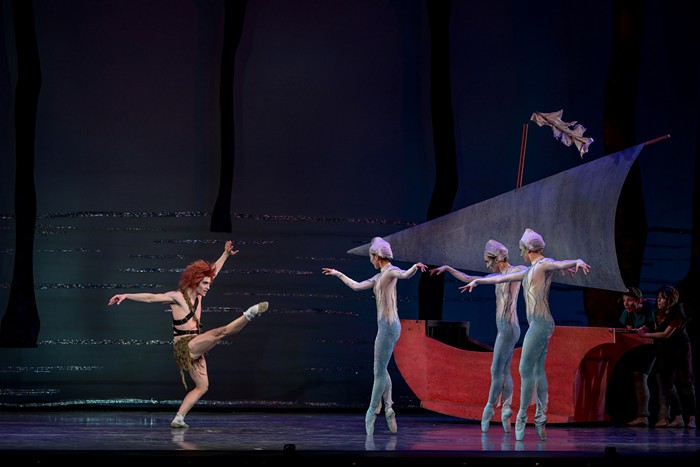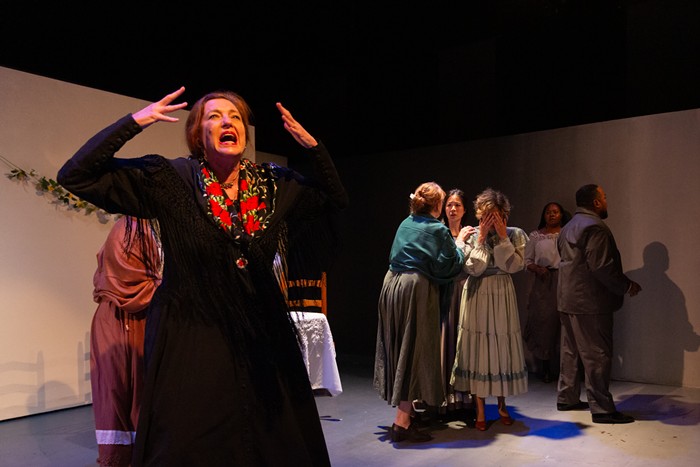HOW MUCH backstory can there be for a boy who never grew up?
Just enough, it turns out, and then some.
Portland Playhouse's production of Peter and the Starcatcher is a prequel to Peter Pan. It's family-friendly with live piano accompaniment, and you might worry at first, upon seeing the sheet-like curtain in front of the stage, that when it pulls open, some boy who didn't want to grow up will soon be hoisted with ropes and pulleys—flying—in school-play fashion. Fear not! The show does not deal in such antics. Instead, there are hilarious cross-dressing mermaids, crafty wordplay, and any ropes on stage are used in fascinating ways to turn the space into many settings—ship, dock, or island—for the 100 characters played by 12 actors.
The story is as fun, inventive, and unique as the original, and that can be hard to find in a prequel. In this version, adventurous 13-year-old Molly (Jennifer Rowe), accompanied by her nurse, the adoring, alliterative Betty Brumbrake (Sam Dinkowitz), sets forth on the S.S. Neverland, while her father, Lord Aster, boards the fast-sailing Wasp—along with a trunk containing precious cargo for the Queen ("God save her!") which Aster must deliver to Rundoon. The Neverland is also supposed to carry a decoy trunk, but thanks to Captain Slank, the decoy and the Queen's trunk are switched. Also on the S.S. Neverland are three miserable orphan boys who have been sold to the ship's captain—one of whom has no name and hates grown-ups. When Molly meets him she feels suddenly "a little bit more grown up" herself—and thus the seeds of bittersweet adolescent romance are sown.

The play's structure is prone to an over-reliance on narration by the chorus and actors to tell the audience about the intricacies of the plot and how characters are feeling—including a rather protracted group monologue at the outset that explains the story's premise. But the play soon rises above these choral voice-overs, and it's as easy to give in as you might to a bedtime story read aloud. The production coheres particularly when the cunning villain enters: Pirate Black Stache (Isaac Lamb) and his faithful sidekick, the sometimes-clever Smee (Darius Pierce). Lamb's performance, in a play chock-full of very funny and distinctive performers, is a show-stealer. Black Stache is in search of a suitable counterpart—a hero—as well as the Queen's trunk, and Lamb makes the most of this anti-romance, as well an assortment of linguistic blunders, malapropisms, idiosyncratic literary allusions, and imagery, "evocative as a madeleine in a Proust novel," as he would say.
The Peter and the Starcatchers series—on which Rick Elice's play is based—was written by Dave Barry and Ridley Pearson and published by a subsidiary of Disney, and there is something of a Disney animated feature feel to Peter and the Starcatcher—in the best ways. Sure, there's plenty of slapstick action, but the dialogue—with puns and alliteration, fast jokes, and the occasional allusion to Proust—isn't merely aimed at the younger set. It's possible to be juvenile and intelligent. Co-directors Rebecca Lingafelter (co-founder of Portland Experimental Theatre Ensemble, seen recently in another nautical adaptation, Or, the Whale) and Brian Weaver direct a play that brings out that part in you that never grew up: the part that can imagine mermaids when seeing tattooed men in shower curtains with bowls for brassieres, and the part that can envision grown adults to be children and a small wooden stage to be a ship's cabin, an underground grotto, and a jungle. To me, that's more spectacular than anything requiring 3D glasses.


















